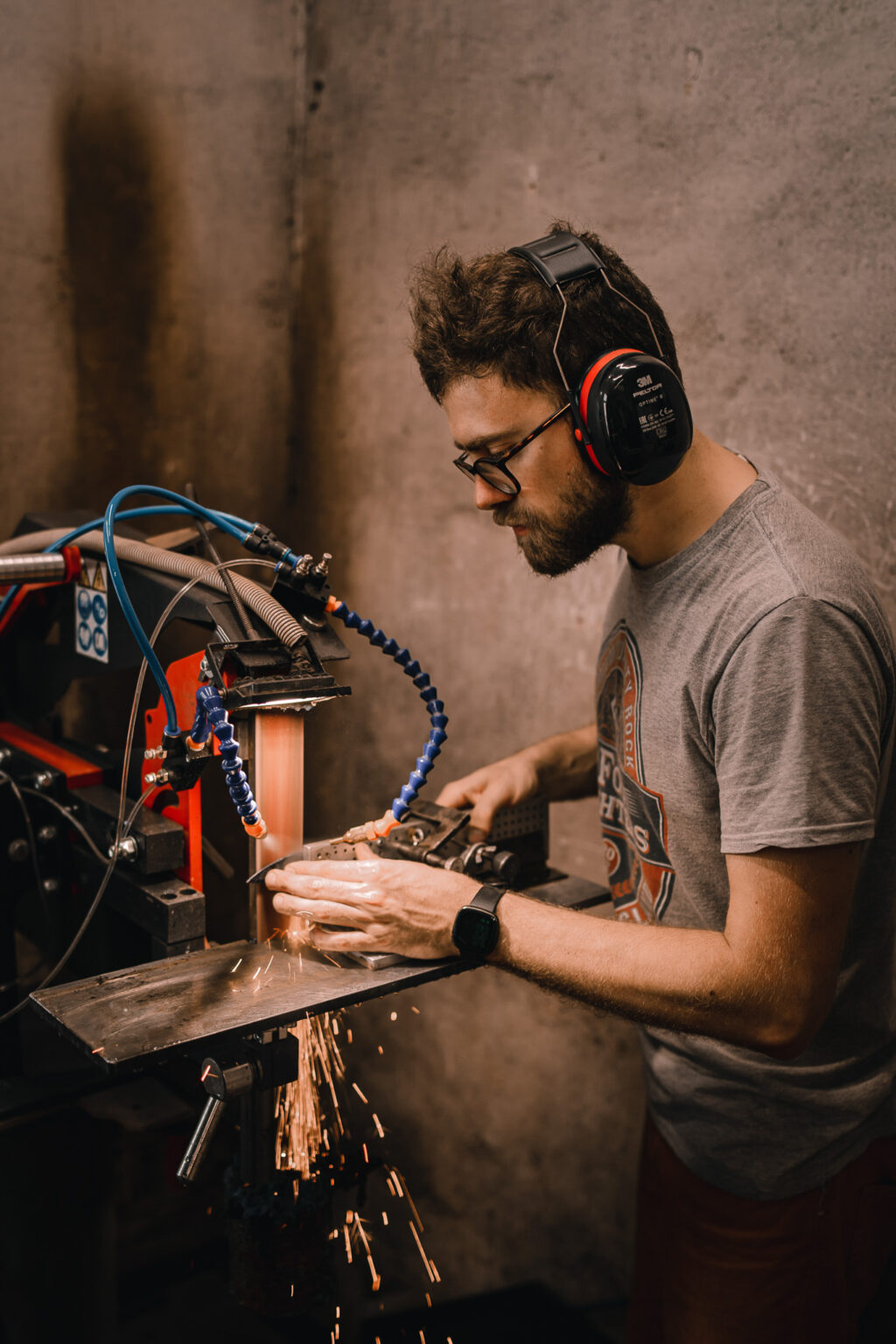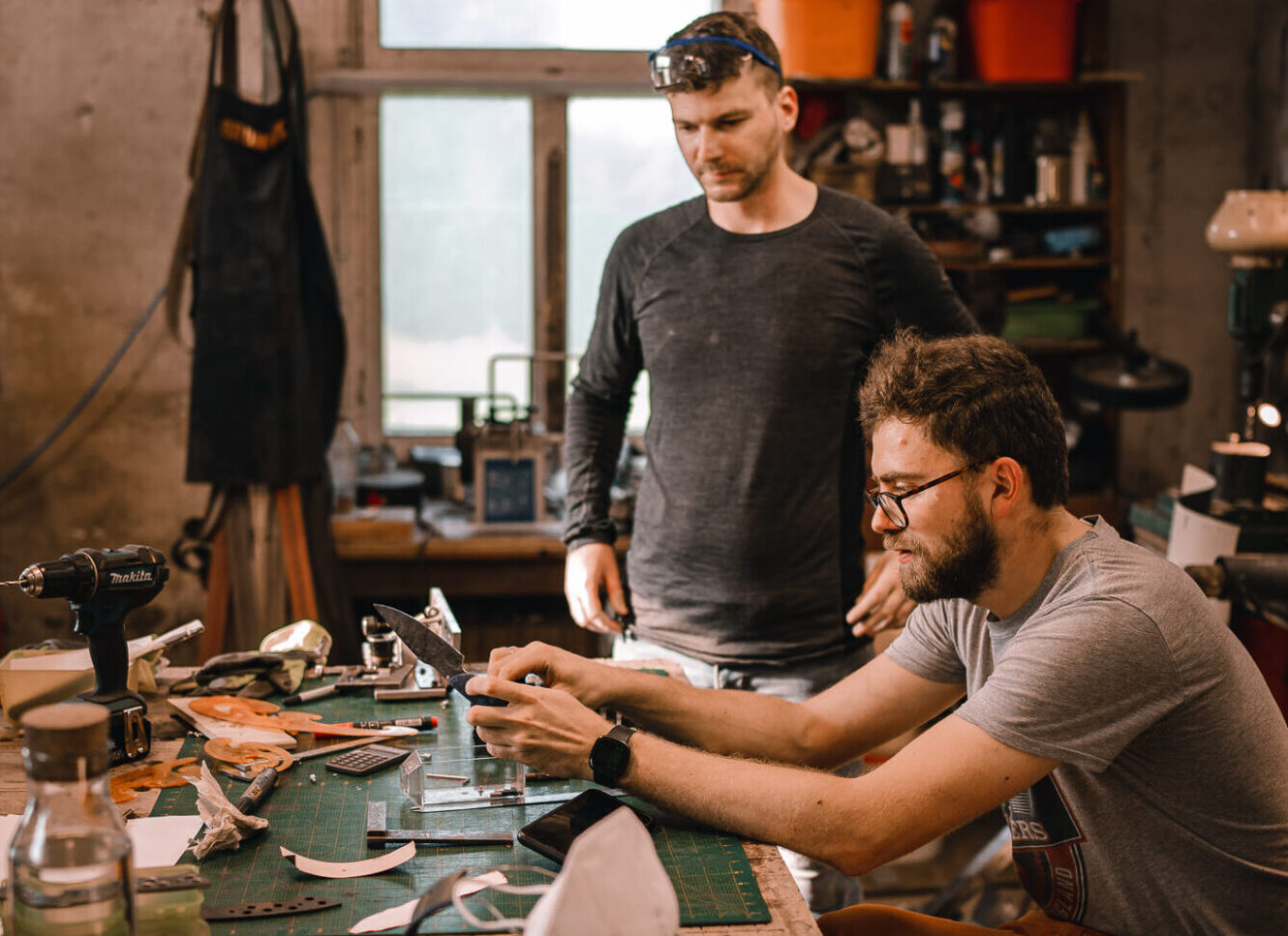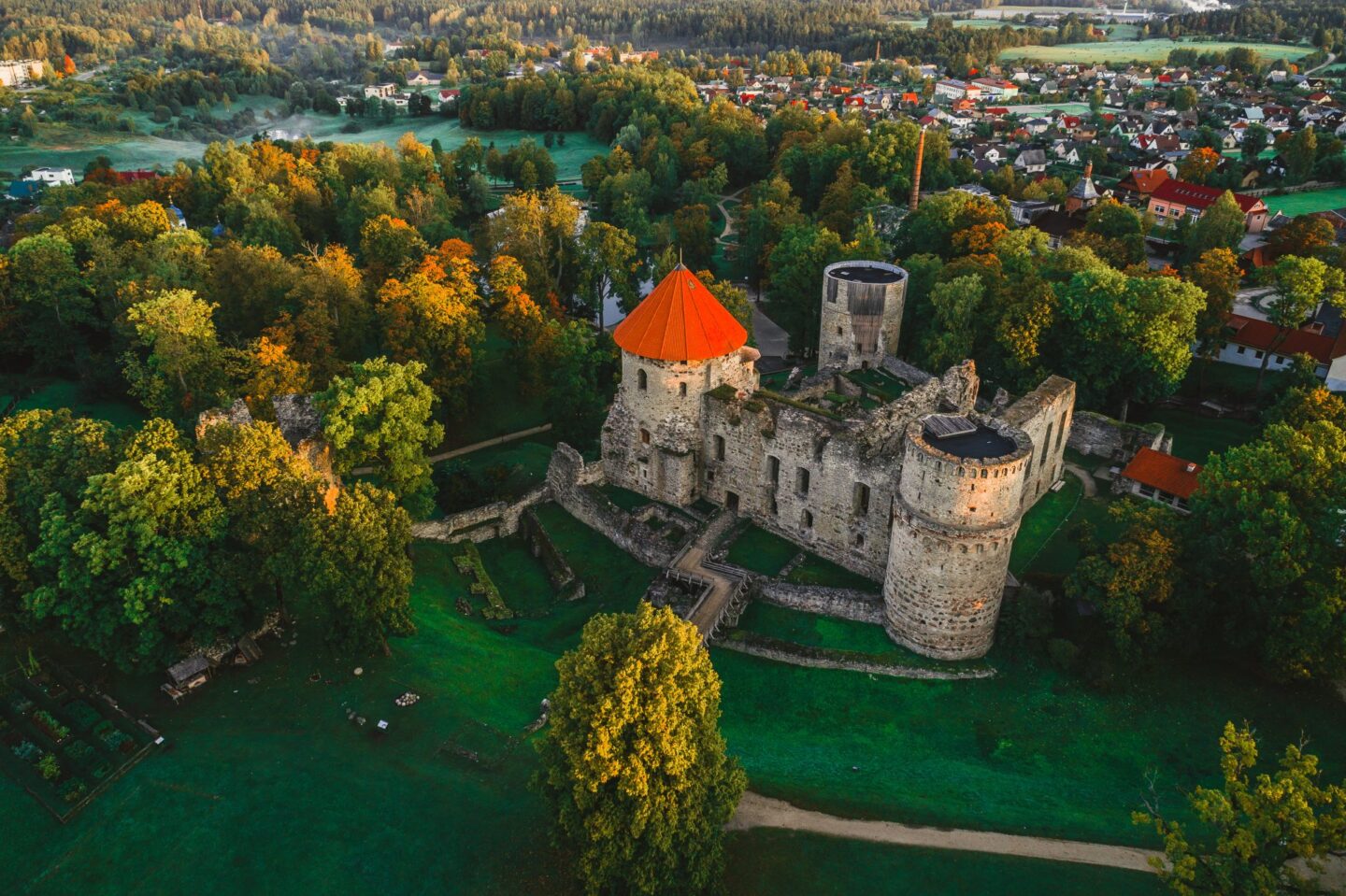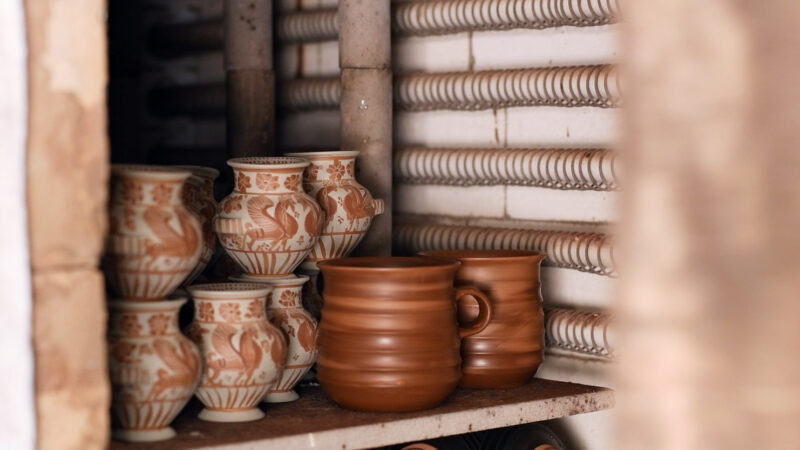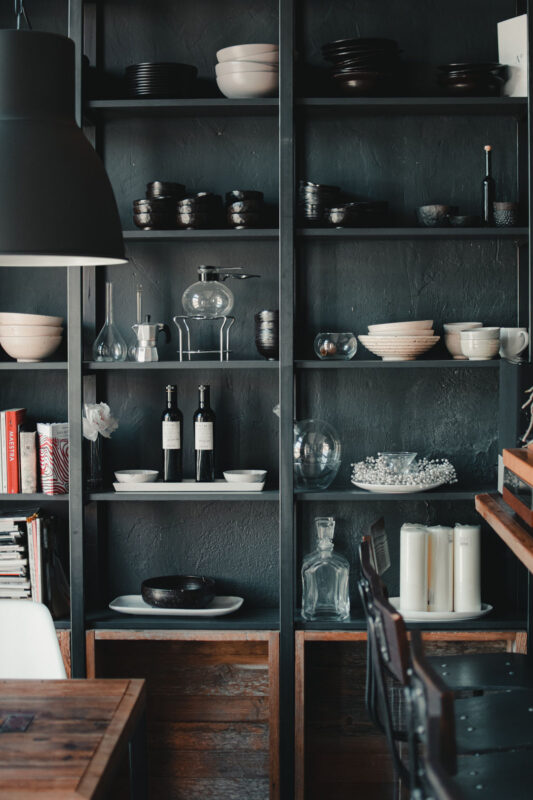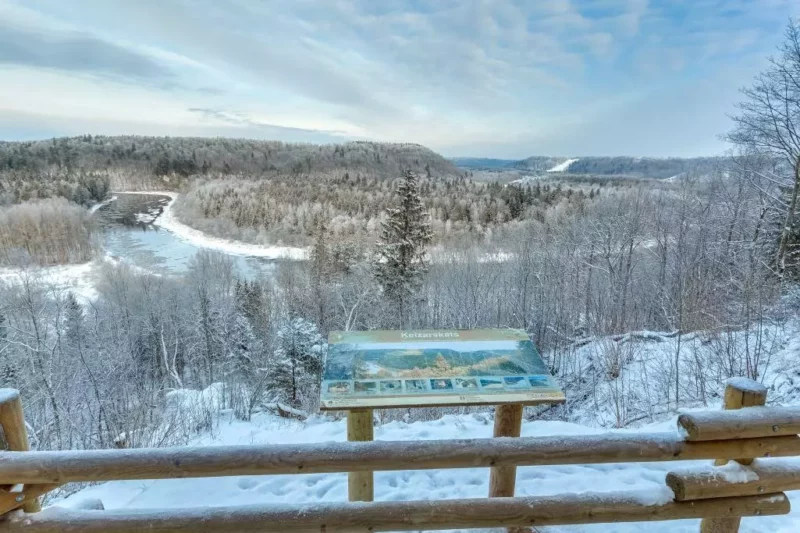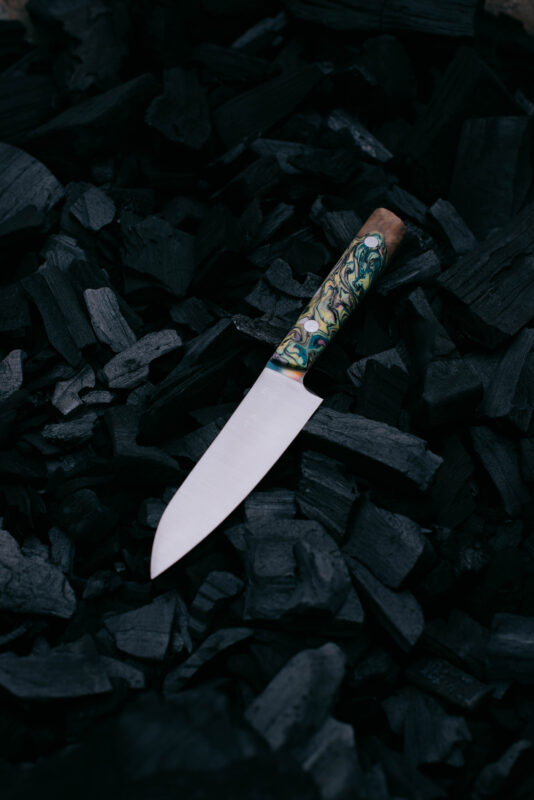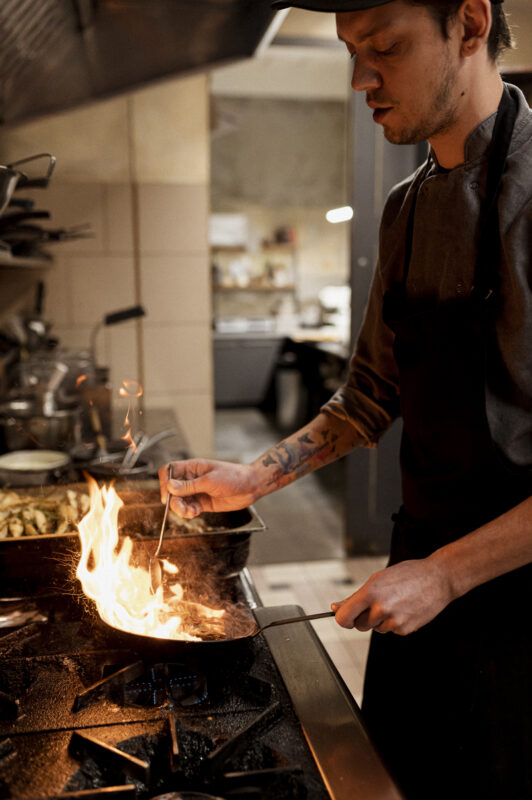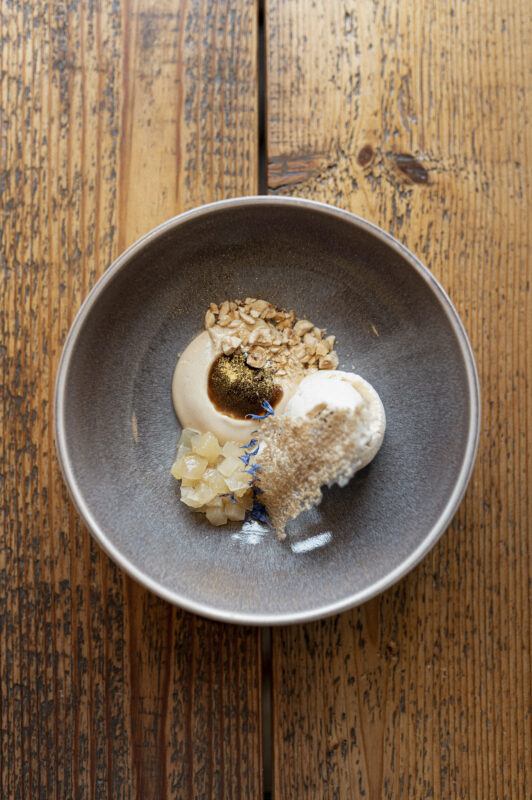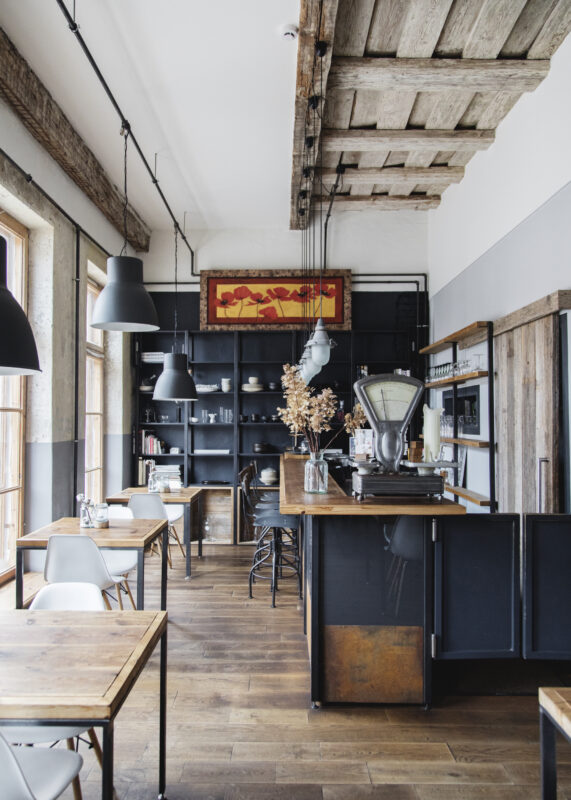Grīnbergs has loved working with his hands since his childhood and has tried out various crafts. What began as a hobby in 2014 has developed into his passion over the last decade. Today, he specialises in fine kitchen knives and focuses on functionality and ergonomic simplicity in his designs. Some handles are colourful, others minimalist – always with the aim that the knives work well, feel comfortable and look good.
Some of them are traditionally forged with a hammer and anvil, while others are shaped with a home-made belt grinder. Grinbergs uses unconventional materials: powder metallurgical steel combined with birch bark or recycled carbon steel with carbon fibre handles. Although his knife handles can be vibrant and abstract, he remains true to the classic, time-honoured techniques of knife making.
© Courtesy of the artist
Which place do you currently call home and where do you work on your projects?
I live at the border of Gauja National Park, and both my home and my workshop are located 15 minutes away from a small town called Cēsis, which was established in medieval times. It’s a great place to live because it’s very quiet, and owning a rather large piece of land means that I am not disturbing neighbours by forging or grinding at odd hours.
Cēsis has enough restaurants, cafés, and grocery stores, a concert hall, cinema, and lively parks. As Latvia is a very forest-dense country, I really enjoy the natural surroundings and the peace it provides.
Do you have a favourite place in your area where you like to relax and linger?
When I want to relax, my first choice is nature, which is one of the main reasons why I live in the countryside. During warmer months, my favorite way to unwind is a couple of hours on a bicycle. As I ride through the woods and gravel roads, I feel mentally rested. I even started bikepacking last year, which is similar to hiking/trekking, but you don’t need to carry the weight on your shoulders as your bike does that for you.
The local concert hall and cinema also provide some events of interest. And let’s be honest – I work all the time because I really love my craft and don’t stop thinking about improvements and new ideas even during off-hours.
© Latvia Travel
Are there any urgent political issues or problems in your region?
We have a long eastern border with Russia, which has occupied Latvia previously. With the ongoing war in Ukraine, there is a sense of uncertainty about maintaining peace as the status quo. Looking at the big picture, I would say that our country is too dependent on imported goods and resources, and we should strive to be more self-sustainable. Unfortunately, fewer people know how to grow their own food, and even fewer actually do so.
In your opinion, what has developed well in the last 5 years – and what has not?
In Cēsis, there have been a lot of investments in culture and real estate. Co-working spaces, restaurants, and even a cosmic center have been opened, meaning that the town is alive. However, seasonality impacts these local businesses quite a lot.
There is some burdensome bureaucracy that affects my neighbours – farmers. Endless paperwork and convoluted processes make it time-consuming and frustrating to comply with government regulations. Streamlining bureaucratic procedures would not only alleviate the administrative burden but also allow people to focus more on actually working and contributing to the local economy, fostering a healthier environment for small businesses.
The tax system is also a concern, as small business owners like me pay way more in taxes than large companies that have different and, I would say, more development- and investment-oriented tax systems.
Do you know a hidden gem when it comes to local manufacturers – whether it’s arts and crafts, sustainable products or food?
Ozolins pottery is a craft that also involves working with his hands and is his passion. This couple makes fine hand-painted porcelain and, in contrast, black or reduced ceramics that are fired the old-school way in a huge brick and clay kiln heated by firewood. Family owned and family operated. Not only Ozolins pottery is a hidden gem but also Laima Ceramics. It’s a clean-looking Japanese and Scandinavian design mix in handmade pottery that is family owned and family operated.
Regarding food, Pavāru Māja Līgatne is a place that recently got awarded with a Michelin Green Star, and they have the brightest flavours from the region. They are located in a really small village that has a lot of sandstone basements/pantries carved into cliffs for storing fresh produce during the winter, such as potatoes and beetroots. They also sell birch sap syrup, which is like a Nordic answer to balsamic vinegar.
Remigiusz Fetzki, an artisanal baker, combines traditional methods with creative flair. His handmade breads and pastries reflect a deep commitment to quality and innovation, offering a blend of comforting classics and surprising new flavours.
© Laima Ceramics
Is there anything particularly innovative in your region? Also in comparison to other places you have already visited?
I would say that we are still hard-working and eager to become entrepreneurs even with limited starting capital. People are ready to find solutions due to these constraints. For instance, one of my neighbouring houses was built using straw walls and rammed earth walls. In our town, there is a small manufacturing facility producing insulation made from old newspapers, providing a completely ecological and sustainable alternative to synthetic materials.
Another sustainable and innovative way of building things is Dores. They are building pre-fab contemporary log houses. Very traditional type of building and very innovative way of preparing the materials. The engineering behind it, in my opinion, is amazing. We have very strong roots in audio engineering. There are several world-class small manufacturers that produce audio equipment for recording studios and artists. However, I would like to mention Kalvins Pianos upright standing piano.
Do you have a secret restaurant tip that you would like to share with us?
Previously mentioned: Pavāru Māja Līgatne. They serve you the brightest flavours in the whole region. A bit further away you would find Akustika Valmiera. A restaurant with a warm atmosphere where culture and cuisine meet. The restaurant’s menu emphasizes local, seasonal ingredients and offers a family-friendly atmosphere. Additionally, it hosts various events, such as concerts, and has been recognized in the MICHELIN Guide for its cozy gathering spaces and dedicated children’s play area. In our region, it’s hard to find naturally leavened sourdough bread. In Bakery Kekss in Valmiera, there are always fresh and amazing artisanal sourdoughs available and the best croissants. Goldingen Room is located in the most beautiful and well-preserved small town of Kuldīga. Family owned and operated, this restaurant is my favourite.
© Goldingen Room
Is there a local shop whose products are only available in your region?
One thing that stands out is Straupe Slow Food Farmers Market that takes place once every two weeks, and there are some local cheeses, wines, and local grass-fed meats that one can’t get anywhere else. Nowadays, even the most local businesses have online stores, and you can order almost anything to be delivered at your doorstep.
What are your 3 favourite apps that you use every day and couldn’t live without?
– Instagram: for communicating with my customer base and showcasing my work
– Gmail: for communicating with clients
And probably the timer app, as a lot of food prep I do is strictly timed, and the same goes for heat treatment procedures for my craft.
Do you have any favourite newspapers or online magazines? And how do you keep up to date with politics or social and cultural issues?
To find out about political, social, and cultural issues, I use X, Instagram, and YouTube by following a bunch of different journalists and news channels.
The only physical magazine I order is called Bikepacking, and it’s literally packed with great stories and photos from multi-day bike adventures. That inspires me to do the same.
Imagine you could be mayor for a year – what would you change?
I would offer more information (also provide it during high school) on how to start a business and provide an extensive list of available properties so anyone who wants to open a small shop or handmade manufacturing could get a list of available places/spaces. Town-owned properties should not be empty, so I would offer them to start-ups for reduced costs. I would massively improve bicycle infrastructure in the streets and make the town bike-friendly so people would exchange their cars for bicycles.
© Latvia Travel
One last question: If you could choose another place to live – regardless of financial or time constrains – which one would you choose?
I would pick a similar town to my hometown, but in the Italian or Austrian Alps. And a property just outside of it would be perfect.
New Zealand also sounds tempting. However, I really like being where I am now.
© Courtesy of the artist
